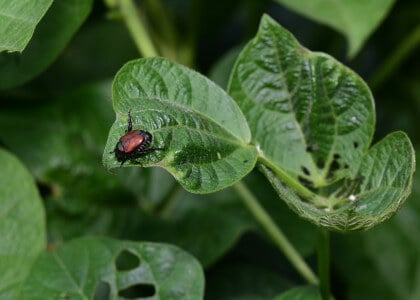We all love our beautiful plants and trees, however, sometimes these plants can come with unwanted visitors. Unfortunately, these unwanted visitors can be very damaging to you’re plants health and beauty. Therefore, we decided to give you a hand. Here are some quick tips and tricks to identifying, solving, and preventing pests.
IDENTIFYING
 Photo Credit: Garden Tech
Photo Credit: Garden Tech
-Look for discoloration, holes in leaves, spots or marks on leaves or branches. These symptoms could mean a serious pest problem is at play. Do research to find out what these symptoms can mean.
-Check to see if it's widespread to other plants in the neighborhood. This will make the problem easier to identify, otherwise sometimes if you can’t identify the problem the best thing to do is just wait it out and see if the problem resolves itself. Continue caring for your plant and if it doesn’t go away, or gets worse, seek expert advice.
-Try to catch one of the insects to easier identify what kind of problem you’re dealing with. Bring the insect and a piece of the plant to a specialist so they can help you identify the problem and come up with a solution.
-DON’T start spraying chemicals until you know what’s wrong with it. Spraying without knowing what the real problem is can do more harm than good. Always do your research before you start spraying away!
SOLVING
 Photo Credit: Shawna Coronado
Photo Credit: Shawna Coronado
-Put fences up to keep animals away. Animals can feed on and ruin your plants. Putting fences up can help keep away animals like deer, squirrels, chipmunks, rabbits, etc. Make sure you know what kinds of animals you are dealing with so you know what kind of fence you need, and how large it has to be.
-Use repellants. When using repellants carefully read the product descriptions. Make sure they are the best for your particular pest problems and make sure they won’t cause harm to the plant. Some may be more harmful to your plants than others, be sure to read application instructions and details before use.
-Use radios/sound. Many animals will be scared away if they hear a sound or talking. By placing a radio outside in your yard they likely will stay away.
-Use strong scents. Some strong scents will deter certain animals; placing bars of soap or other strong-smelling items throughout your yard will help prevent these animals from coming in. Make sure you find out what scents animals in your area dislike.
-Change your watering habits. Changes in watering habits can affect the life and establishment of some pests. Sometimes even blasts of water from a hose will drive these pests away.
-Call in a professional. A professional can help you come up with the best and most effective solution to your specific situation.
PREVENTING

-Continue using solution techniques like strong scents, repellants, and radios/sound.
-Make changes in pruning practices to relieve chronic disease problems. Sometimes changing your care can affect your pest problems. Making sure to remove any diseased or dead leaves and branches as soon as you see them is always beneficial.
-Pull weeds as they appear. Weeds can host unwanted pests, and removing them can only be beneficial to your plant's health.
-Do a Fall cleanup! Making sure you do a full cleanup in the fall can help reduce and or eliminate future problems for the coming year. Raking, removing, and destroying dead leaves and branches, as well as removing any weeds is a good way of reducing damage for next year.
-Choose plants that are more problem resistant. Choosing plants that are more animal or bug resistant can cut down on your problems tremendously. So if you know you have problems with certain animals or bugs in your area, do some research and find out what plants would cut down on these problems.
-Call in a professional. Professionals can always help in suggesting more problem-resistant plants, or the best ways to prevent problems in the future.
-Monitor the situation. By staying vigilant and watching out for beneficial and harmful insects, you can often make adjustments before serious problems arise.

